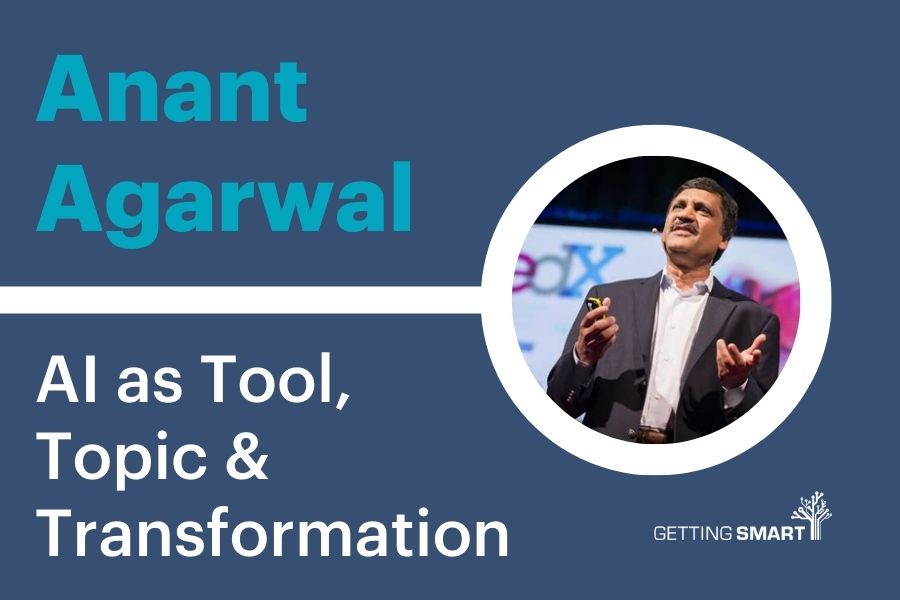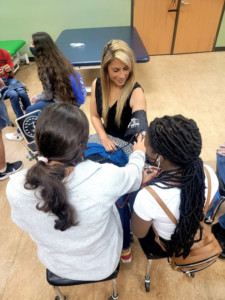Anant Agarwal on AI as Tool, Topic and Transformation
Key Points
-
Ethics must be taught alongside AI technology.
-
The next phase of iteration is not only about scale, but about personalization.

We’ve recently released a new publication that synthesizes years of research on AI and its impact on teaching and learning. You can find it at GettingSmart.com/artificial-intelligence/
On this episode of the Getting Smart Podcast, Nate McClennen is joined by Anant Agarwal, MIT Professor, Chief Platform Officer at 2U and Founder and CEO of edX, an online learning platform founded by Harvard and MIT. In 2020, Anant shared the story and vision for EdX from inception to present and its effort to increase access, reduce cost, and implement modularity in the higher education ecosystem. So much has happened in the last three years, that we thought it would be great to hear from Anant again (after his first time on the show) to get his sense of AI and how it will play a role in both teaching in higher education as well as a topic for learning in higher education.
Transcript
Nate McClennan: You are listening to the Getting Smart Podcast. Welcome, everybody. I’m Nate McClennan, and we’ve been talking a lot about new pathways at Getting Smart in our campaign to understand more and better options for every single learner, leading them toward productive citizenship, high-wage employment, economic mobility, and a purpose-driven life. Some of the core pillars of these new pathways include unbundled learning, credentialing, and merging these learning experiences into new school models. However, higher education is challenged on many fronts, with declining enrollments mirroring the declines in the public K-12 sector. Universities and organizations that support new pathways through credentialing, micro-degrees, and certificates, as well as more affordable bachelor’s and master’s degrees, are better positioned to survive the enrollment challenges ahead. These pathways also address the challenge of high college debt without degrees, which affects many adults.
We’ve also been talking a lot about AI and its impacts on K-12 education, yet we know AI will also influence lifelong learning, from cradle to grave, including higher education—both in pedagogy and in terms of content. AI will be a tool for hyper-personalization and a topic integrated into many courses. There’s a lot of work to do, and luckily we have organizations and people tackling these challenges so that learners of all ages can benefit from personalized pathways and access the technical skills crucial to professional success.
Today, I’m excited to welcome back a repeat guest, Anant Agarwal, an MIT professor, Chief Platform Officer at 2U, and the founder and CEO of edX, an online learning platform founded by Harvard and MIT. In 2020, Anant shared with us the story and vision for edX—from its inception to the present—and its efforts to increase access, reduce costs, and implement modularity in the higher education ecosystem. So much has happened in the past three years that we thought it would be great to hear from Anant again to understand AI’s role in teaching and learning in higher education. Welcome back, Anant. We’re very grateful for your time and all your contributions to education over your career.
Anant Agarwal: Hello, and thank you for having me back, Nate. I’m delighted to join you in this incredible conversation about AI—it’s taking over the world.
Nate McClennan: It is indeed, and I know you’re thinking a lot about it, so I’m excited to hear your thoughts on AI as both a tool to enhance teaching in higher education and a topic for learning within higher education. Let’s start by framing the journey of edX for our listeners who are education leaders, educators, and innovators. Could you provide some context by taking us back to the beginning, with MIT OpenCourseWare?
Anant Agarwal: Sure. Around the year 2000, MIT released all its content online as MIT OpenCourseWare. Video lectures and static homework were all available online. At MIT, where I’ve taught for 36 years, we’ve continually thought about ways to increase access to education. Then, Salman Khan, who was my student at MIT in the ‘90s, released Khan Academy videos. His work inspired me and MIT, showing us new possibilities. By 2008, several technologies—like cloud computing, video distribution, mobile computing, and social networking—came together, and we felt we could bring these advancements into education.
In 2011, MIT and Harvard came together to launch edX, taking OpenCourseWare to the next level. Instead of long lecture recordings, we introduced short videos, graded assignments, interactive forums, and certification. edX has grown into a platform where learners worldwide can earn certificates by passing courses from institutions like MIT, Harvard, Oxford, Cambridge, Berkeley, Stanford, and companies like Google and IBM. Today, we have 76 million learners, 4,000 courses, and 230 institutional partners, offering everything from individual courses to boot camps, executive education, and full degrees.
Nate McClennan: That’s amazing. And the partnership with 2U—edX is now part of 2U, correct?
Anant Agarwal: Yes, about two years ago, edX merged with 2U. Now, all our offerings are under the edX brand, with 2U’s live services in degrees, boot camps, and executive education complementing edX’s open courses. This merger allows us to offer a comprehensive catalog under the edX brand.
Nate McClennan: Incredible growth—76 million learners, 4,000 courses, hundreds of partners. It really increases access, which is fundamentally what you all are aiming to do, and that makes the world a better place. So, let’s dive into AI. It’s everywhere right now, and we believe AI will hyper-personalize learning. How do you see AI positively impacting pedagogy, education, and instruction in higher education?
Anant Agarwal: AI has the potential to transform teaching and learning by enabling both massive scale and personalization. With edX, we reached massive scale—my own circuits course at MIT has reached over a million learners. However, personalization was a challenge, as we were offering the same learning experience to everyone. AI allows us to achieve personalization at scale, which I believe is the main tenet of the Fourth Industrial Revolution.
For example, in a large online or in-person class, it’s challenging for a learner to ask questions or get individual feedback. With AI, we’ve introduced a technology called “Expert,” powered by ChatGPT, available to learners in boot camps and soon in courses on edX. Learners can ask questions at any time, and the AI provides answers or guides them using the Socratic method. This allows for real-time, personalized interaction.
Nate McClennan: So edX was already somewhat personalized, allowing learners to choose and arrange their courses. But as you scaled, true personalization was missing because each student was a bit anonymous. Now, with Expert and generative AI, each learner can ask questions and receive tailored responses.
Anant Agarwal: Exactly. Online courses already allowed learners to pause or speed up videos, adding some personalization. However, the learning itself wasn’t adaptive. With AI, we can monitor how learners are doing and personalize their entire learning experience, even providing real-time translations to allow learning in multiple languages.
Nate McClennan: That’s impressive—turning a one-way interaction into a two-way personalized experience. How do you see AI changing pedagogy at MIT, both on the physical campus and online?
Anant Agarwal: AI can help both professors and learners. For professors, AI can assist in creating lecture materials. AI can quickly generate or summarize content, adjusting it for different audiences—say, a 10th-grader or a college freshman. We’re also experimenting with AI to generate questions for active learning. Creating questions, homework assignments, and grading takes significant time for educators, and AI can help ease this workload.
On the learner side, AI can act as a tutor. For example, if a student has a question at midnight, they can get immediate help from AI rather than waiting for an appointment with a TA or professor. AI can also teach students how to use tools like ChatGPT to write drafts, reflecting the changes in writing and critical thinking skills required in today’s job market.
Nate McClennan: So, as AI reduces the time professors spend on prep and grading, could their role shift? Perhaps professors would have more time for personal interaction with students or could experiment with new pedagogical models.
Anant Agarwal: Absolutely. With online learning and platforms like edX, we already saw professors shifting from “sage on the stage” to “guide by the side.” AI will extend this further, allowing professors to spend more time thinking about new ways to teach or on personal interactions with students. Professors could work with students in small groups or on group projects—activities where personal mentorship is essential.
Nate McClennan: That’s a valuable shift. I like the idea of more time for thinking and for personal interactions with students. What are your thoughts on the nervousness surrounding AI? Are there any downsides, and how can we mitigate them?
Anant Agarwal: There are certainly concerns. People are often afraid of AI because it’s unknown—it feels like a black hole. For educators, there’s anxiety about job security and academic integrity. One way to address this is to demystify AI, showing that it’s simply a tool. Like a knife, AI can be used for good or bad—it’s up to us as technologists and educators to use AI for positive outcomes. By focusing on AI for the better and developing tools that empower people, we can alleviate much of this anxiety.
Nate McClennan: That’s a fantastic approach. Let’s talk about what edX is doing to help people quickly learn about AI, whether it’s ethics, technical skills, or other aspects.
Anant Agarwal: AI will transform the future of work across all sectors, creating a huge demand for upskilling and reskilling. At edX, we’ve launched various courses, including free courses on ChatGPT and courses on prompt engineering. We also launched a boot camp in AI that teaches Python programming—a foundational skill for AI—and covers topics from data science to coding applications.
For executives, we offer courses like “AI for Executives” with partners like MIT, so leaders can understand AI’s potential in their industries. And learners can start small, with micro-credentials or boot camps, and eventually pursue full degrees like the $10,000 master’s in AI we launched with UT Austin.
Nate McClennan: Can learners combine these smaller courses and credentials to eventually earn a full degree, or is it all kept separate?
Anant Agarwal: It’s not an either-or situation. Learners can earn micro-credentials, like a professional certificate in coding and AI from Harvard, and stack these into a full degree. For instance, we offer a master’s degree in AI with UT Austin—a top-ranked school—for $10,000. It’s our fastest-growing degree. Learners can start with smaller, stackable components like a boot camp in data science, then pursue a full degree later. This approach gives flexibility to learners.
For example, we have a boot camp in data science from Southern Methodist University. If you complete that, you can stack it into a master’s degree in data science from the same university. This flexibility allows learners to tailor their education journey.
Nate McClennan: Tons of options! I can see many educators and education leaders being interested in the various pathways for AI learning on your platform. Here’s a more philosophical question: Do you envision a future where a learner could create a 100% customizable degree, essentially an edX degree, without a university partner’s branding?
Anant Agarwal: It wouldn’t be an “edX degree” per se, as the components come from various universities and corporate partners. But many learners are already piecing together an education through micro-credentials and courses from different institutions. For instance, you could complete a MicroMasters in data science from MIT, then take a professional certificate in business from the Indian Institute of Management in Bangalore. You could aggregate these credentials, and with certain universities, like Thomas Edison State University, they may offer credit toward a degree for these micro-credentials.
Many employers find value in these skill-based certificates because they clearly demonstrate a learner’s capabilities, like Python programming or marketing analytics. We’re also encouraging universities to provide skill-based certificates alongside traditional degrees to better articulate what students learn.
Nate McClennan: For a long time, we’ve used degrees as a proxy for skills, but employers are now recognizing that specific skills might not always align with a degree. Being able to articulate skills through micro-credentials helps. I could also see organizations encouraging employees to upskill on edX to better serve clients or meet goals. That’s especially crucial for adult learners.
Anant Agarwal: Absolutely, and it’s even more critical for adult learning. Let’s say you have a degree in computer science but need to learn writing skills for your job. You could take a professional writing course from Arizona State University on edX. Or, if you have a psychology degree and want to become a manager, you could pursue an MBA online through one of our partner institutions or take a professional certificate to learn specific skills in accounting or finance. Hybrid skills are increasingly important, and platforms like edX help learners acquire these.
Nate McClennan: That ties back to personalization. AI will help personalize learning, but platforms like edX allow massive personalization by breaking down the degree into smaller, customizable components. This has been an amazing conversation. To wrap up, what would you like education leaders to take away from our discussion? And is there an organization or individual you’d like to highlight?
Anant Agarwal: My main message is that while there’s a lot of fear surrounding AI, we should view it as a tool we can harness for positive outcomes. There’s a saying I like: AI won’t take away your job, but if someone else uses AI more effectively, they might take your job. There’s a self-interest in learning AI, so let’s focus on using AI for good.
As for an organization, I’d like to highlight Axim Collaborative. When edX was acquired by 2U, Axim Collaborative emerged as the nonprofit overseeing open edX. This platform is open-source and used globally. For example, all of Ukraine is using open edX for learning continuity in the face of war. Axim Collaborative is doing incredible work in managing and advancing this platform, and I’m excited to see how they continue to incorporate AI to make open edX more powerful.
Nate McClennan: We’ll include links to Axim Collaborative and open edX in the show notes. I love your focus on ethical AI use. You mentioned earlier that AI ethics are part of UT Austin’s master’s program, which is essential as we continue to explore AI’s potential. It’s important for organizations, school districts, and companies to clearly state their principles on responsible AI use.
Anant Agarwal: Absolutely. At edX, we’ve established core principles for responsible AI use, emphasizing that AI should help humanity and respect learner privacy. We must be mindful of the data we use to train AI models. Additionally, we’re committed to open-sourcing our AI teaching tools so everyone benefits, not just one company. These principles ensure AI is used ethically and responsibly.
Nate McClennan: That’s a great closing message. AI for good should be our focus as we navigate this rapidly evolving landscape. Anant, I’ve learned so much from you today. Some key points that stood out: scaling learning through edX while using AI for personalization, transforming higher education to benefit both learners and educators, and the importance of AI ethics. Your work on edX, open edX, and Axim Collaborative is truly making a difference in education and accessibility. Thank you for your time and everything you’ve done to make education better for the world.
Anant Agarwal: Thank you so much, Nate, and thank you for having me on the show.
Links:







0 Comments
Leave a Comment
Your email address will not be published. All fields are required.